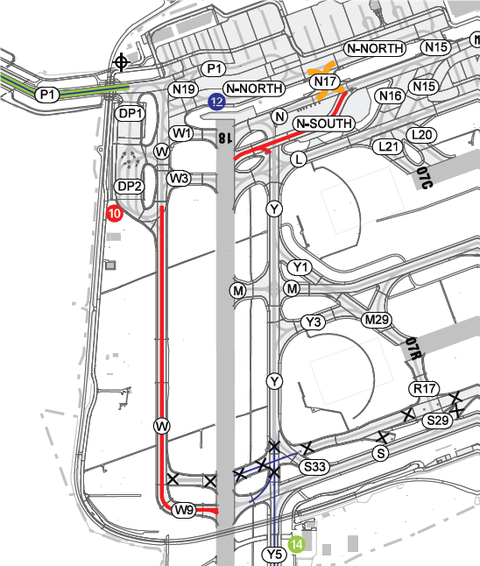Research Seminar 2019: Solution strategies for dealing with unavoidable obstacles on the aerodrome site
TASK
The operation of large aircraft types presents the existing airport infrastructure with new challenges in terms of conformity with national and international guidelines. These may require local adaptations of the existing taxiing concept.
The time discrepancy between airport (expansion) planning processes, the subsequent planning approval decision and the implementation of the construction project itself sometimes contributes to the fact that traffic forecasts of the planning process are already outdated for the planned time of commissioning. As a consequence, forecast traffic figures and assumed aircraft types can deviate significantly from real conditions. In order to ensure safe and orderly flight operations, compliance with national (e.g. LuftVG) and international standards (e.g. ICAO Annex 14 and CS-ADR-DSN) must therefore be checked after infrastructure adjustments. In the case of identified deviations, appropriate measures must be taken in each case.

Focus of the study area at EDDF
At the 2019 research seminar (without knowledge of the real taxiing concept and without in-depth knowledge of already implemented risk mitigation strategies), conformity testing will therefore be carried out with regard to national and internationally defined obstacle areas for a part of Frankfurt am Main Airport (EDDF). The safety-critical weak points at taxi holding postions identified in the process are to be evaluated and mitigated by risk reduction strategies.
The aim of the research seminar 2019 is to carry out an assessment of the roll holding locations west of the thresholds of the SLB 07R and 07C with regard to applicable national and international obstacle guidelines as well as national guidelines for obstacle detection areas according to the BMVI all-weather guideline. If the guidelines are violated, solution strategies are to be developed that enable safe, efficient and sustainable operation on the airport site. The prevailing approach/departure types and the composition of traffic from different aircraft types must be taken into account. The safety critical areas must then be identified and scenario specific concepts developed.
The developed concepts should be discussed and evaluated with regard to their overall efficiency. For the evaluation of the efficiency the economic efficiency or the safety of the developed concepts have to be considered and evaluated appropriately.
For the verification of the solution strategies according to ICAO, EASA and national regulations, licenses for the AutoCAD based software AviPLAN and SkySAFE from Transoft Solutions are available.
The research seminar will be supervised by Prof. Fricke, who holds the chair, as well as Mrs. Ahnert and Mr. Steinmeier, who are members of the chair. Dr. Bierwagen and Dr. Leemüller from Deutsche Flugsicherung (DFS) supported the practice. We would like to take this opportunity to thank them once again for their commitment!
In addition to dealing with technical issues, the aim of the seminar is to train the necessary project management skills. For the students, independent project work with the facets of time management and milestone fulfilment, self-organisation and teamwork are also at the forefront of their work. The necessary project management activities must be monitored, controlled and, if necessary, delegated by the project management.
Disclaimer
The presented content appears within the context of student research projects. The TU Dresden excludes all warranties for scientific quality and accuracy of the results. Publication / transfer / usage of the drafts, either complete or in parts, requires the agreement of TU Dresden. Therefore, please contact the office of the chair.
